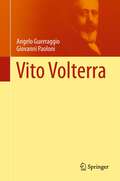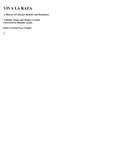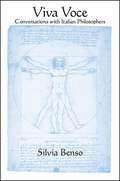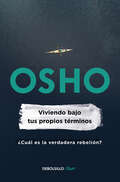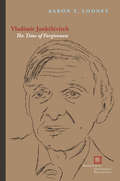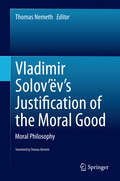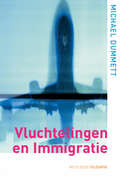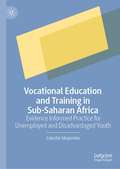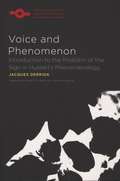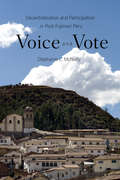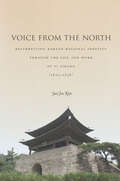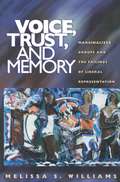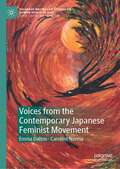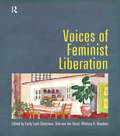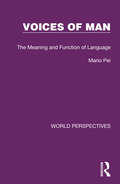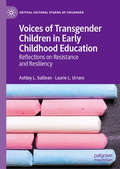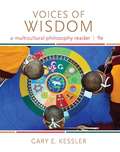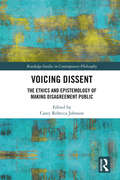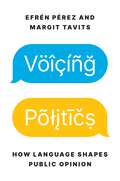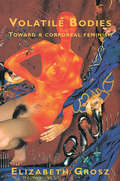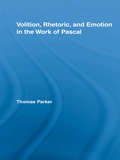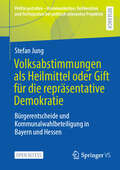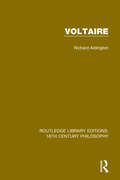- Table View
- List View
Vito Volterra
by Giovanni Paoloni Angelo Guerraggio Kim WilliamsVito Volterra (1860-1940) was one of the most famous representatives of Italian science in his day. Angelo Guerragio and Giovanni Paolini analyze Volterra's most important contributions to mathematics and their applications, as well as his outstanding organizational achievements in scientific policy. Volterra was one of the founding fathers of functional analysis and the author of fundamental contributions in the field of integral equations, elasticity theory and population dynamics (Lotka-Volterra model). He delivered keynote lectures on the occasion of the International Congresses of Mathematicians held in Paris (1900), Rome (1908), Strasbourg (1920) and Bologna (1928). He became involved in the scientific development in united Italy and was appointed senator of the kingdom in 1905. One of his numerous non-mathematical activities was founding the National Research Council (Consiglio Nazionale delle Ricerche, CNR). During the First World War he was active in military research. After the war he took a clear stand against fascism, which was the starting point for his exclusion. In 1926 he resigned as president of the world famous Accademia Nazionale dei Lincei and was later on excluded from the academy. In 1931 he was one of the few university lecturers who denied to swear an oath of allegiance to the fascistic regime. In 1938 he suffered from the impact of the racial laws. The authors draw a comprehensive picture of Vito Volterra, both as a great mathematician and an organizer of science.
Vittorio Benussi in the History of Psychology: New Ideas of a Century Ago (Studies in the History of Philosophy of Mind #21)
by Mauro AntonelliThis book covers the basic guidelines of Vittorio Benussi’s research during the period at Graz and at Padua. It does so in the light of a thorough study of his Nachlass. The book re-evaluates Benussi’s work as a historical piece, and shows how his work is still relevant today, especially in the areas of cognitive psychology and cognitive science. The volume deals with this original and ingenious - though largely ignored - scholar and discusses his work as a leading experimental psychologist. Benussi’s contributions as discussed in this book were particularly relevant in the fields of visual and tactile perception, time perception, forensic psychology, hypnosis and suggestion, unconscious, and emotions. His classical papers are impressive in their originality, energy, range of approaches, experimental skill, the wealth of findings, and the quality of theoretical discussions. This book demonstrates that Benussi was ahead of his time and that his themes, experiments and research programmes are highly relevant to contemporary cognitive psychology.
Viva La Raza: A History of Chicano Identity and Resistance
by Yolanda Alaniz Megan CornishLiterary Nonfiction. Political Science. Latino/Latina Studies. LGBT Studies. A lively and accessible investigation of Mexican American militancy from the U.S. occupation of Northern Mexico in the 19th century to civil rights struggles in the present era. The authors describe monumental labor battles, survey the Raza youth movement, focus attention on the role of women, and examine issues such as police brutality, the emergence of Chicana/o lesbians and gays, and the role of radical organizations, while also exploring hotly debated theories about the source of discrimination against Chicanos. <p><p>VIVA LA RAZA reveals the workings of race and nationality in the United States in relation to people of Mexican ancestry, a group that is too little understood though its members comprise this country's second largest population of people of color.
Viva Voce: Conversations with Italian Philosophers (SUNY series in Contemporary Italian Philosophy)
by Silvia BensoThrough conversations with twenty-three leading Italian philosophers representing a variety of scholarly concerns and methodologies, this volume offers an informal overview of the background, breadth, and distinctiveness of contemporary Italian philosophy as a tradition. The conversations begin with general questions addressing issues of provenance, domestic and foreign influences, and lineages. Next, each scholar discusses the main tenets, theoretical originality, and timeliness of their work. The interviews conclude with thoughts about what directions each philosopher sees the discipline heading in the future. Every conversation is a testimony to the differences that characterize each thinker as unique and that invigorate the Italian philosophical landscape as a whole. The individual replies differ widely in tone, focus, and style. What emerges is a broad, deep, lively, and even witty picture of the Italian philosophical landscape in the voices of its protagonists.
Vivekananda on Culture and Inequality
by Amod N. DamleSwami Vivekananda remains one of the most influential and contested figures in modern Indian history. Revered by some as a liberal reformer who challenged the caste system, and by others as a progenitor of Hindu nationalism, Vivekananda&’s legacy straddles deep contradictions. Vivekananda on Culture and Inequality offers a critical examination of these tensions by focusing on his cultural philosophy and its implications for social hierarchy and national identity. This book explores how Vivekananda&’s vision of culture—rooted in spiritual and philosophical ideals—both challenged and upheld systems of inequality. While he spoke of dignity for all and national unity, his cultural ideal placed Brahmanical Hinduism at the apex of a spiritual hierarchy, ultimately justifying social divisions rather than dismantling them. Through a close reading of his writings and speeches, the book argues that Vivekananda&’s cultural nationalism subtly transformed inequality into a moral and spiritual necessity. By situating Vivekananda&’s thought within contemporary debates on nationalism, social justice, and religious identity, this study sheds light on the enduring appeal of his ideas among large segments of the Hindu public. It also raises pressing questions about how culture is used to legitimize inequality in today&’s world—making this book essential reading for scholars and students of religion, political theory, South Asian studies, and cultural history.
Viviendo bajos tus propios términos
by Osho¿Cuál es la verdadera rebelión? En Viviendo bajo tus propios términos, Osho nos revela cómo podemos oponernos a las normas contrarias a nuestros valores con el fin de preservar nuestra individualidad. Décadas después de las rebeliones de los años sesenta, estamos desafiando de nuevo estructuras y valores del pasado, sobre todo los relacionados con sistemas políticos y económicos obsoletos. Tenemos la oportunidad y responsabilidad de ampliar el concepto de libertad humana. En este contexto, la visión del gran maestro del siglo xx nos ayudará a promover nuevos sistemas para el bien de la humanidad. «La gente sólo puede ser feliz de una manera: siendo auténtica. Así las fuentes de su felicidad empiezan a fluir y se vuelven más vivos, es una alegría verlos, estar con ellos. Son una canción, un baile.» Osho
Vladimir Jankélévitch: The Time of Forgiveness (Perspectives in Continental Philosophy)
by Aaron T. LooneyVladimir Jankélévitch: The Time of Forgiveness traces the reflections of the French philosopher and musicologist Vladimir Jankelevitch on the conditions and temporality of forgiveness in relation to creation, history, and memory. The author demonstrates the influence of Jewish and Christian thought on Jankelevitch’s philosophy and compares his ideas about the gift character of forgiveness, the role of retributive emotions in conceptions of justice, and the limits of reason with those of Aristotle, Butler, Kant, Kierkegaard, Nietzsche, Scheler, Arendt, Derrida, Levinas, and Ricoeur.The Shoah was the pivotal historical event in Jankelevitch’s life. As this book shows, Jankelevitch’s question “Is forgiveness possible as a response to evil?” remains a potent philosophical conundrum today. Paradoxically, for Jankelevitch, evil is both the impetus and the obstacle to forgiveness.
Vladimir Solov'ëv's Justification of the Moral Good
by Thomas NemethThis new English translation of Solov'ëv's principal ethical treatise, written in his later years, presents Solov'ëv's mature views on a host of topics ranging from a critique of individualistic ethical systems to the death penalty, the meaning of war, animal rights, and environmentalism. Written for the educated public rather than for a narrow circle of specialists, Solov'ëv's work largely avoids technical vocabulary while illustrating his points with references to classical literature from the ancient Greeks to Goethe. Although written from a deeply held Christian viewpoint, Solov'ëv emphasizes the turn from his earlier position, now allegedly developing the independence of moral philosophy from metaphysics and revealed religion. Solov'ëv sees the formal universality of the idea of the moral good in all human beings, albeit that this idea is bereft of material content. This first new English-language translation in a century makes a unique contribution to the study of Solov'ëv's thought. It uses the text of the second edition published in 1899 as its main text, but provides the variations and additions from the earlier versions of each chapter in running notes. Other unique features of this translation are that the pagination of the widely available 1914 edition is provided in the text, and the sources of Solov'ëv's numerous Biblical quotations and references as well as literary and historical allusions.
Vluchtelingen en immigratie (Routledge filosofie)
by Sir Michael DummettMichael Dummett, eminent filosoof en scherpzinnig maatschappijcriticus, pleit al vele jaren voor een eerlijke behandeling van immigranten en vluchtelingen in Europa. In dit inzichtelijke boek heeft hij voor de eerste keer al zijn gedachten over deze belangrijke kwestie gebundeld.Na een eerste verkenning van de verwarde en vaak zeer onrechtvaardige opvattingen over immigratie, onderwerpt Dummett de principes en rechtvaardigingen van het desbetreffende overheidsbeleid aan een nauwkeurig onderzoek, waarbij hij erop wijst dat dit beleid vaak in strijd is met de rechten van vluchtelingen zoals die in het Verdrag van Genève zijn neergelegd. Aan de hand van confronterende en vaak aangrijpende voorbeelden wijst Vluchtelingen en immigratie de weg naar een nieuwe, meer menswaardige benadering van een probleem dat wij niet mogen negeren.
Vocational Education and Training in Sub-Saharan Africa: Evidence Informed Practice for Unemployed and Disadvantaged Youth
by Celestin MayombeThis book analyses the accessibility and success of vocational training programmes for unemployed and disadvantaged youth in Sub-Saharan Africa. Examining the implementation of vocational education and training programmes, the author assesses various internal and external enabling factors that can help foster youth employment. In doing so, the author presents a solid base for robust and evidence-informed practice and policy making for vocational training programmes, analysing such themes as employability skills, the labour market, and work-integrated learning. It also emphasises the importance of stakeholders taking into account the enabling and disabling environments found in a given local, regional or national context. It will be of interest to scholars of vocational training programmes in Sub-Saharan Africa and elsewhere, as well as of youth poverty and unemployment.
Voice and Phenomenon: Introduction to the Problem of the Sign in Husserl's Phenomenology
by Jacques Derrida Leonard LawlorPublished in 1967, when Derrida is 37 years old, Voice and Phenomenon appears at the same moment as Of Grammatology and Writing and Difference. All three books announce the new philosophical project called "deconstruction. " Although Derrida will later regret the fate of the term "deconstruction," he will use it throughout his career to define his own thinking. While Writing and Difference collects essays written over a 10 year period on diverse figures and topics, and Of Grammatology aims its deconstruction at "the age of Rousseau," Voice and Phenomenon shows deconstruction engaged with the most important philosophical movement of the last hundred years: phenomenology. Only in relation to phenomenology is it possible to measure the importance of deconstruction. Only in relation to Husserl's philosophy is it possible to understand the novelty of Derrida's thinking. Voice and Phenomenon therefore may be the best introduction to Derrida's thought in general. To adapt Derrida's comment on Husserl's Logical Investigations, it contains "the germinal structure" of Derrida's entire thought. Lawlor's fresh translation of Voice and Phenomenon brings new life to Derrida's most seminal work.
Voice and Vote
by Stephanie L. McnultyIn the months following disgraced ex-President Alberto Fujimori's flight to Japan, Peru had a political crisis on its hands. The newly elected government that came together in mid-2001 faced a skeptical and suspicious public, with no magic bullet for achieving legitimacy. Many argued that the future of democracy was at stake, and that the government's ability to decentralize and incorporate new actors in decision-making processes was critical. Toward that end, the country's political elite devolved power to subnational governments and designed new institutions to encourage broader citizen participation. By 2002, Peru's participatory decentralization reform (PDR) was finalized and the experiment began. This book explores the possibilities and limitations of the decision to restructure political systems in a way that promotes participation. The analysis also demonstrates the power that political, historical, and institutional factors can have in the design and outcomes of participatory institutions. Using original data from six regions of Peru, political scientist Stephanie McNulty documents variation in PDR implementation, delves into the factors that explain this variation, and points to regional factors as prime determinants in the success or failure of participatory institutions.
Voice from the North: Resurrecting Regional Identity Through the Life and Work of Yi Sihang (1672-1736)
by Sun Joo KimVoice from the Northresurrects the forgotten historical memory of the people and region in late Choson Korea while also enriching the social history of the country. Sun Joo Kim accomplishes this by examining the life and work of Yi Sihang, a historically obscure person from a hinterland in Korea's northwestern region who was also a member of the literati. Unlike many of his contemporaries, Yi Sihang left numerous writings on his region's history and culture, and on the political and social discrimination that he and others in his region faced from the central elite. This work explores a regional history and culture through the frames of microhistory and historical memory. Kim criticizes the historiographical problem of "otherizing" the northern region and fills a gap in Korean historiography—the lack of historical study of the northern region from a regional perspective, P'yongan Province in particular. The biographical format of this work engages readers in the investigation of a person's life within the changing world of his time and also creates a space where private and public intersect. Kim places Yi Sihang at the center of the historical stage while describing, analyzing, and reconstructing the world around him through his life story.
Voice, Trust, and Memory: Marginalized Groups and the Failings of Liberal Representation
by Melissa S. WilliamsDoes fair political representation for historically disadvantaged groups require their presence in legislative bodies? The intuition that women are best represented by women, and African-Americans by other African-Americans, has deep historical roots. Yet the conception of fair representation that prevails in American political culture and jurisprudence--what Melissa Williams calls "liberal representation"--concludes that the social identity of legislative representatives does not bear on their quality as representatives. Liberal representation's slogan, "one person, one vote," concludes that the outcome of the electoral and legislative process is fair, whatever it happens to be, so long as no voter is systematically excluded. Challenging this notion, Williams maintains that fair representation is powerfully affected by the identity of legislators and whether some of them are actually members of the historically marginalized groups that are most in need of protection in our society.Williams argues first that the distinctive voice of these groups should be audible within the legislative process. Second, she holds that the self-representation of these groups is necessary to sustain their trust in democratic institutions. The memory of state-sponsored discrimination against these groups, together with ongoing patterns of inequality along group lines, provides both a reason to recognize group claims and a way of distinguishing stronger from weaker claims. The book closes by proposing institutions that can secure fair representation for marginalized groups without compromising principles of democratic freedom and equality.
Voices from the Contemporary Japanese Feminist Movement (Palgrave Macmillan Studies on Human Rights in Asia)
by Caroline Norma Emma DaltonThis book introduces six key influential feminist activists from Japan’s contemporary feminist movement and examines Japanese women’s experience of and contribution to the international #MeToo movement. Set against a backdrop of pervasive sexual inequality in Japanese society—on a scale that makes Japan an outlier in Asia as well as the rest of the advanced democratic world—this book offers a snapshot of Japan’s contemporary feminist movement and the issues it faces, including, primarily, sexual violence and harassment of women and girls. The six feminist activists interviewed to create this snapshot all work toward eradicating sexual violence against women and girls—they are: Kitahara Minori (instigator of the Flower Demo and public commentator), Yamamoto Jun (activist for sex crime law amendments), Nitō Yumeno (advocate for sexually exploited girls), Tsunoda Yukiko (feminist lawyer), Mitsui Mariko (former politician and current activist), and Yang-Ching-Ja (comfort women activist).
Voices of Feminist Liberation: Writings In Celebration Of Rosemary Radford Ruether
by Whitney Bauman Emily Leah Silverman Dirk von der Horst'Voices of Feminist Liberation' brings together a wide range of scholars to explore the work of Rosemary Radford Ruether, one of the most influential feminist and liberation theologians of our time. Ruether's extraordinary and ground-breaking thinking has shaped debates across liberation theology, feminism and eco-feminism, queer theology, social justice and inter-religious dialogue. At the same time, her commitment to practice and agency has influenced sites of local resistance around the world as well as on globalised strategies for ecological sustainability and justice. 'Voices of Feminist Liberation' examines the potential of Ruether's thinking to mobilize critical theology, social theory and cultural practice. The scholars gathered here present their personal engagements with Ruether's thinking and teaching. The book will be invaluable to scholars, policy-makers, and activists seeking to understand how colonial and patriarchal oppression in the name of religion can be confronted and defeated.
Voices of Man: The Meaning and Function of Language (World Perspectives #8)
by Mario PeiOriginally published in 1964, this book examines where and how the pattern and texture of speech emerged and whether language is logical. It looks at linguistics from both the historical and descriptive points of view, as a physical science and as a social science. It also discusses the problem of aesthetics in language and what happens when different languages come into contact with each other. The book concludes with a discussion of the possibility of an international language, and indeed whether such a development would be progress or something that is needed or wanted.
Voices of Transgender Children in Early Childhood Education: Reflections on Resistance and Resiliency (Critical Cultural Studies of Childhood)
by Ashley L. Sullivan Laurie L. UrraroThis volume explores transgender children and internalized body normalization in early childhood education settings, steeped in critical methodologies including post-structuralism, queer theory, and feminist approaches. The book marries theory and praxis, submitting to current and future teachers a text that not only presents authentic narratives about trans children in early childhood education, but also analyzes the forces at work behind gender policing, gender segregation, and transphobic education policies. As the struggles and triumphs of trans individuals have reached a watershed moment in the social fabric of the United States, this text offers a snapshot into the lives of ten transgender people as they reflect on their earliest memories in the American educational system.
Voices of Wisdom: A Multicultural Philosophy Reader 9th Edition
by Gary E. KesslerIntroduces readers to basic philosophical questions in ethics, epistemology, and metaphysics through a collection of engaging and culturally diverse readings. Both classic and contemporary in its approach, this revised and updated Ninth Edition includes key texts from the Buddha, Plato, Immanuel Kant, Martin Luther King, Jr. , John Rawls, Martha Nussbaum, Nelson Mandela and others. Using these landmark writings, VOICES OF WISDOM: A MULTICULTURAL PHILOSOPHY READER, 9E takes readers on a multicultural journey through such topics as terrorism, civil disobedience, homosexuality, human rights, animal rights, language, truth, and power.
Voicing Dissent: The Ethics and Epistemology of Making Disagreement Public (Routledge Studies in Contemporary Philosophy)
by Casey Rebecca JohnsonDisagreement is, for better or worse, pervasive in our society. Not only do we form beliefs that differ from those around us, but increasingly we have platforms and opportunities to voice those disagreements and make them public. In light of the public nature of many of our most important disagreements, a key question emerges: How does public disagreement affect what we know? This volume collects original essays from a number of prominent scholars—including Catherine Elgin, Sanford Goldberg, Jennifer Lackey, Michael Patrick Lynch, and Duncan Pritchard, among others—to address this question in its diverse forms. The book is organized by thematic sections, in which individual chapters address the epistemic, ethical, and political dimensions of dissent. The individual contributions address important issues such as the value of disagreement, the nature of conversational disagreement, when dissent is epistemically rational, when one is obligated to voice disagreement or to object, the relation of silence and resistance to dissent, and when political dissent is justified. Voicing Dissent offers a new approach to the study of disagreement that will appeal to social epistemologists and ethicists interested in this growing area of epistemology.
Voicing Politics: How Language Shapes Public Opinion (Princeton Studies in Political Behavior #45)
by Margit Tavits Efrén PérezWhy your political beliefs are influenced by the language you speakVoicing Politics brings together the latest findings from psychology and political science to reveal how the linguistic peculiarities of different languages can have meaningful consequences for political attitudes and beliefs around the world. Efrén Pérez and Margit Tavits demonstrate that different languages can make mental content more or less accessible and thereby shift political opinions and preferences in predictable directions. They rigorously test this hypothesis using carefully crafted experiments and rich cross-national survey data, showing how language shapes mass opinion in domains such as gender equality, LGBTQ rights, environmental conservation, ethnic relations, and candidate evaluations.Voicing Politics traces how these patterns emerge in polities spanning the globe, shedding essential light on how simple linguistic quirks can affect our political views. This incisive book calls on scholars of political behavior to take linguistic nuances more seriously and charts new directions for researchers across diverse fields. It explains how a stronger grasp of linguistic effects on political cognition can help us better understand how people form political attitudes and why political outcomes vary across nations and regions.
Volatile Bodies: Toward A Corporeal Feminism (Theories Of Representation And Difference Ser.)
by Elizabeth GroszVolatile Bodies is based on a risky wager: that all the effects of subjectivity, psychological depth and inferiority can be refigured in terms of bodies and surfaces. It uses, transforms and subverts the work of a number of distinguished male theorists of the body (Freud, Lacan, Merleau-Ponty, Schilder, Nietzsche, Foucault, Lingis and Deleuze) who, while freeing the body from its subordination to the mind, are nonetheless unable to accomodate the specificities of women's bodies. Volatile Bodies explores various dissonances in thinking the relation between mind and body. It investigates issues that resist reduction to these binary terms - psychosis, hypochondria, neurological disturbances, perversions and sexual deviation - and most particularly the enigmatic status of body fluids, and the female body.
Volition, Rhetoric, and Emotion in the Work of Pascal
by Thomas ParkerThis study identifies and analyzes a compelling theory and practice of persuasion that integrates the complexity of human desire. It demonstrates how the philosophical component in Pascal's description of the will makes a seamless integration into a vehicle of persuasion and poetics, providing a privileged viewpoint for understanding the author's complete works, arguing that the notion of will is of fundamental importance in Pascal's anthropology as well as in his rhetoric. This avenue of interpretation is both fruitful and difficult, because the word "volonte" means very different things in Pascal and in modern French. Beginning by contextualizing the notion of 'volonte' and explaining its expanded use in the seventeenth-century lexicon, the author then endeavors to show that Pascal borrows an essentially Augustinian paradigm of desire to create a depiction of the will divided against itself, surreptitiously yearning for what its bearer does not want.
Volksabstimmungen als Heilmittel oder Gift für die repräsentative Demokratie: Bürgerentscheide und Kommunalwahlbeteiligung in Bayern und Hessen (Politik gestalten - Kommunikation, Deliberation und Partizipation bei politisch relevanten Projekten)
by Stefan JungIn diesem Open-Access-Buch wird untersucht, wie die zunehmende Nutzung von Volksabstimmungen die Wahlbeteiligung auf der lokalen Ebene beeinflusst. Mit der Einführung lokaler Volksabstimmungen in Deutschland und vielen anderen Staaten zu Beginn der 90er Jahre war auch die Hoffnung verbunden, die Beteiligung der Bürger*innen wiederzubeleben. Schließlich sank parallel die Beteiligung an lokalen Wahlen rapide. Ebenso gibt es aber auch die Befürchtung, Volksabstimmungen könnten die Krise der repräsentativen Demokratie noch verschärfen. Im Buch wird mit Fokus auf die Wahlbeteiligung der Frage nachgegangen, ob Volksabstimmungen das erhoffte Heilmittel oder eher Gift für die lokale repräsentative Demokratie sind. Mit einer innovativen und erstmals systematisch für die deutschen Bundesländer Bayern und Hessen durchgeführten Längsschnittanalyse wird gezeigt, dass lokale Volksabstimmungen die Kommunalwahlbeteiligung weder generell senken noch steigern. Stattdessen werden abhängig von Kontextfaktoren wie der Abstimmungsbeteiligung und der wirtschaftlichen Lage einer Gemeinde unerwartete positive wie auch negative Nebenwirkungen identifiziert. Das Buch liefert somit eine differenzierte Diagnose der Wirkungen von Volksabstimmungen auf die lokale Demokratie.
Voltaire (Routledge Library Editions: 18th Century Philosophy #17)
by Richard AldingtonThis book, first published in 1929, is an assessment of Voltaire’s life and works. It contains valuable biographical details, as well as studies of his works, philosophy, poetry, plays and literary criticism.
